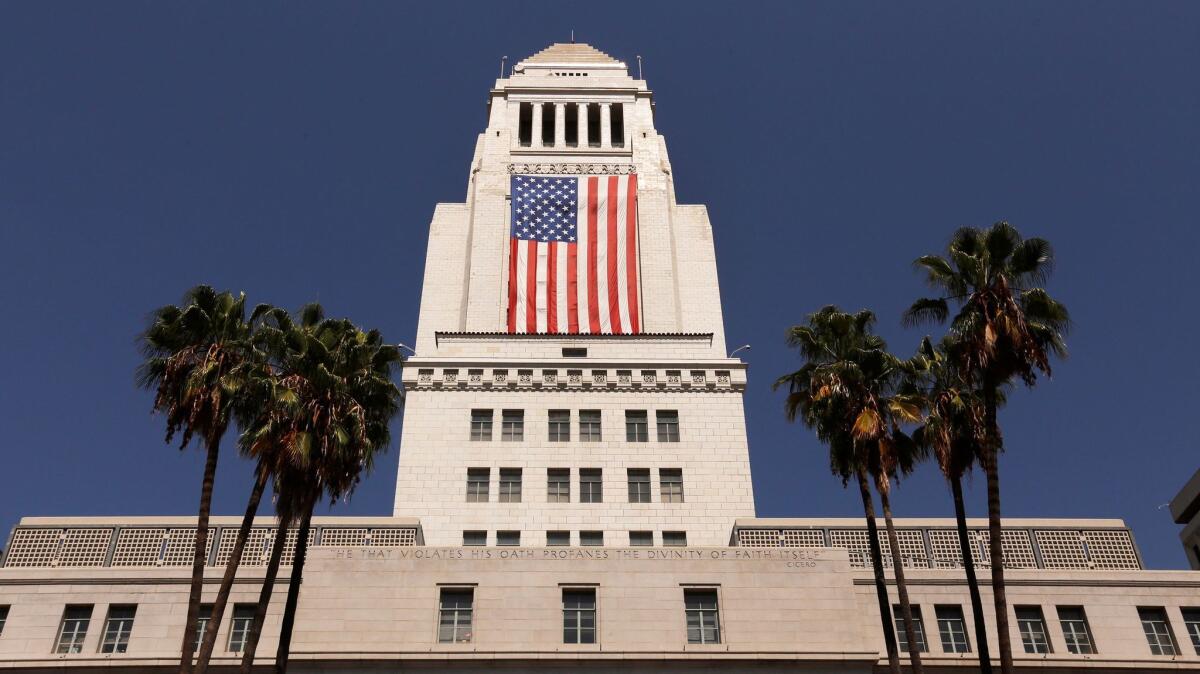L.A. lawmakers delay voting on plan to criminalize flouting rules at city buildings

- Share via
Los Angeles lawmakers say they want to protect people from harm when they go to a protest or come to City Hall.
But a pair of proposed laws have stirred alarm among activists and civil rights groups, who say the city is threatening freedom of speech.
At a committee meeting Wednesday, lawmakers held off on voting on a hotly contested law that would make it a crime to violate any posted rules that govern what people can do in city buildings, libraries and parks.
They pressed forward, however, with another proposed ordinance that would prohibit a long list of items at protests, including pepper spray, baseball bats, glass bottles and stun guns. The proposed ban now heads to the entire council for approval.
“Who in the hell needs a glass bottle ... to express his or her 1st Amendment rights?” City Councilman Joe Buscaino asked.
Both proposals have spurred debate about how L.A. balances public safety and political freedom. Brawls in Berkeley have stoked fears that violence could break out if warring protesters take to the streets in Los Angeles. City lawmakers say they have been unnerved by profane and disruptive gadflies, and last year, police confiscated a tool with a retractable blade from a frequent visitor at City Hall.
But the city has also been repeatedly accused of trampling on free speech. Four years ago, a federal judge ruled that it ran afoul of the 1st Amendment when it cut off or ejected activists speaking at meetings, and the city later paid more than $200,000 to settle a lawsuit from a man kicked out of a commission meeting after showing up in a Ku Klux Klan hood.
Ahead of Wednesday’s hearing, the American Civil Liberties Union of Southern California helped mobilize more than 1,600 people to send letters opposing one of the proposed ordinances, which would outlaw violating posted rules about “use, access and presence” at a city building, library or park as trespassing.
Trespassing can be punished as a misdemeanor, which carries penalties of up to six months in jail and as much as a $1,000 fine.
“We believe this is a thinly veiled attempt to try to silence and intimidate people,” said Melanie Ochoa, staff attorney with the ACLU of Southern California. Ochoa said she was concerned that the city was “making crimes out of conduct too trivial to violate existing law.”
“Could an individual be lawfully arrested for going two minutes over their allotted internet time at the library, or speaking off topic at City Council?” Ochoa asked.
Vanessa Rodriguez, a spokeswoman for City Council President Herb Wesson, said the rules were meant to protect the public in municipal buildings, not to limit free speech. In the face of concerns about possible “unintended consequences,” the council “will review the issues in more depth before advancing the policy,” Rodriguez said in a written statement.
The same ordinance would also restrict what people can bring into city buildings. The proposed law would ban swords, stun guns, knives and pepper spray, but would also prohibit more mundane items such as knitting needles, scissors, laser pointers, flashlights longer than three inches, and folding multipurpose utility tools, which are sometimes carried by bicyclists.
In addition, L.A. could soon ban more than a dozen items from protests, including metal pipes, bricks, balloons filled with noxious material, torches with an open flame and shields made of metal, wood or hard plastic.
Those restrictions have been championed by Councilman Mitch Englander, who argued that they were “common sense” rules needed to prevent the kind of violence that erupted at demonstrations in Berkeley and Charlottesville, Va. At the hearing, LAPD Deputy Chief Horace Frank said that scores of injuries have been reported at protests elsewhere in the country this year, including concussions, lacerations and broken bones.
“This is really an effort to not curtail free speech or demonstration, but to protect the public and the officers,” Englander said.
The new restrictions expand on an existing L.A. law that prohibits protesters from toting wooden planks that exceed a certain size, which Assistant City Atty. Julie Raffish said had already withstood a legal challenge. She added that the city had avoided any rules that appeared to target particular groups and tailored the restrictions to allow safe forms of expression.
For instance, Raffish said that plastic piping is limited, but not totally banned, “because we understand that those would be necessary, perhaps, to hoist a sign above a crowd.”
But civil rights attorneys have questioned whether L.A. can legally ban people from bringing things to protests that they can otherwise legally possess on the street. Activists have also complained that some of the proposed restrictions are overly broad, such as a ban on signs that are not made of soft material or sufficiently thin cardboard.
That prohibition “is targeted at restricting and criminalizing protest rather than making protest safer,” said Akio Katano, an organizer with the progressive group Ground Game L.A.
During the meeting, Councilman Mitch O’Farrell said weapons should be banned but questioned some of the restrictions on signs.
O’Farrell also raised concerns about how the ordinance would be enforced, saying he was worried that immigrants who unwittingly bring banned items to protests could end up facing a criminal charge that might lead to deportation.
Frank said that people carrying prohibited items would be warned and given a chance to turn in banned items or leave the event before facing arrest, which O’Farrell said he found reassuring. Under the proposed law, police are supposed to give a warning “when feasible,” either verbally, through posted signs or in an amplified announcement.
Under a proposed law, L.A. would ban these and other items from protests:
Twitter: @LATimesEmily
More to Read
Sign up for Essential California
The most important California stories and recommendations in your inbox every morning.
You may occasionally receive promotional content from the Los Angeles Times.











